Raspberry doesn’t need a lot of care and attention throughout the year. Fertilizing the Raspberry at the right time of the year helps plants grow and produce delicious fruits. The best fertilizer starts working as soon as your plants are transplanted. Additional applications help plants reach their full potential. Let’s check out the best fertilizer for Raspberry plants.
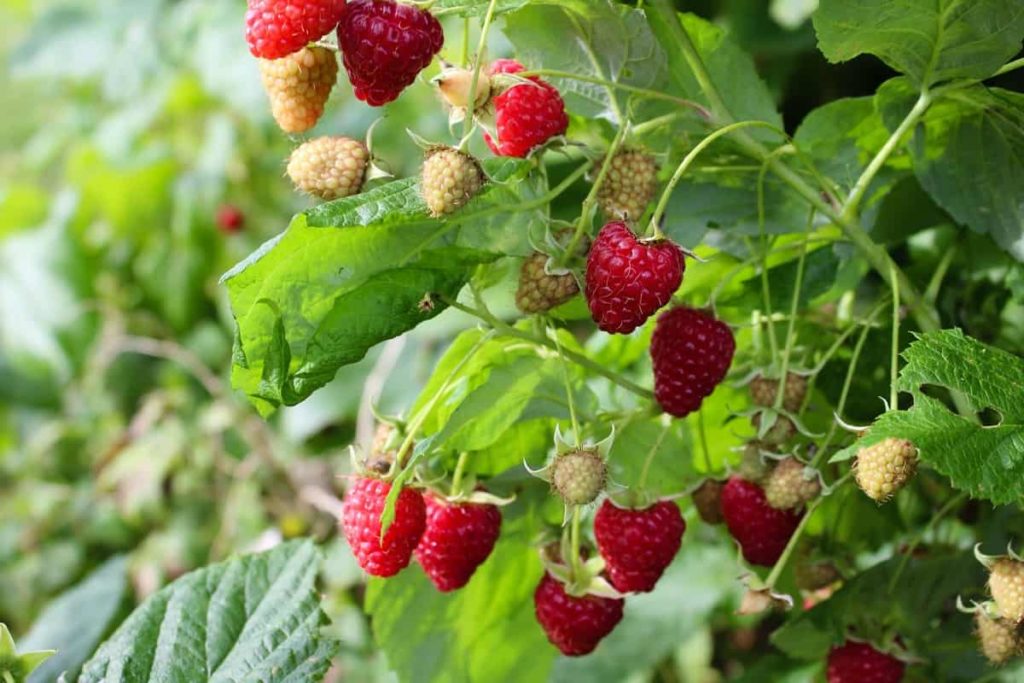
There are some reasons you need to fertilize your Raspberry, even with all these benefits plants already naturally enjoy. Firstly, even when the soil is not very good for them, the Raspberry may continue to grow, but they will not produce so many berries. Like most berry bushes, Raspberry produces the most fruit when things are good. However, if they do not have the nutrients, they will dry up and produce poor crops. All elements are essential for the Raspberry plant; however, nitrogen plays an important role.
It is included in healthy and nutritious fruits and encourages growth while maintaining the plant’s immunity. Hence it is essential to find a high intake of nitrogen. Generally, berries take a significant amount of nitrogen as they carry many seeds within themselves. It also uses other essential elements, such as potassium and phosphates, that perform different functions while the berry matures. Potassium is necessary for the Raspberry plant as it increases the taste, nutrient count, and color. So, you choose a fertilizer that offers reasonable amounts of these three elements; nitrogen, phosphorus, and potassium.
Symptoms of nutrient deficiency
- Thin twigs and small leaves indicate a lack of phosphorus.
- Yellow leaves, with green stripes, iron deficiency.
- The weak growth of leaves and their color turning yellow indicates the absence of magnesium and nitrogen.
- Brown on the edges of leaves indicates a lack of potassium.
- The rapid growth of the green mass means extra nitrogen.
- The fertilizer dose depends on the shape of the plants and the quality of the crop. If thin shoots grow poorly, it is recommended to increase the quantity of fertilizer.
How To Start Raspberry Gardening, Tips, Techniques
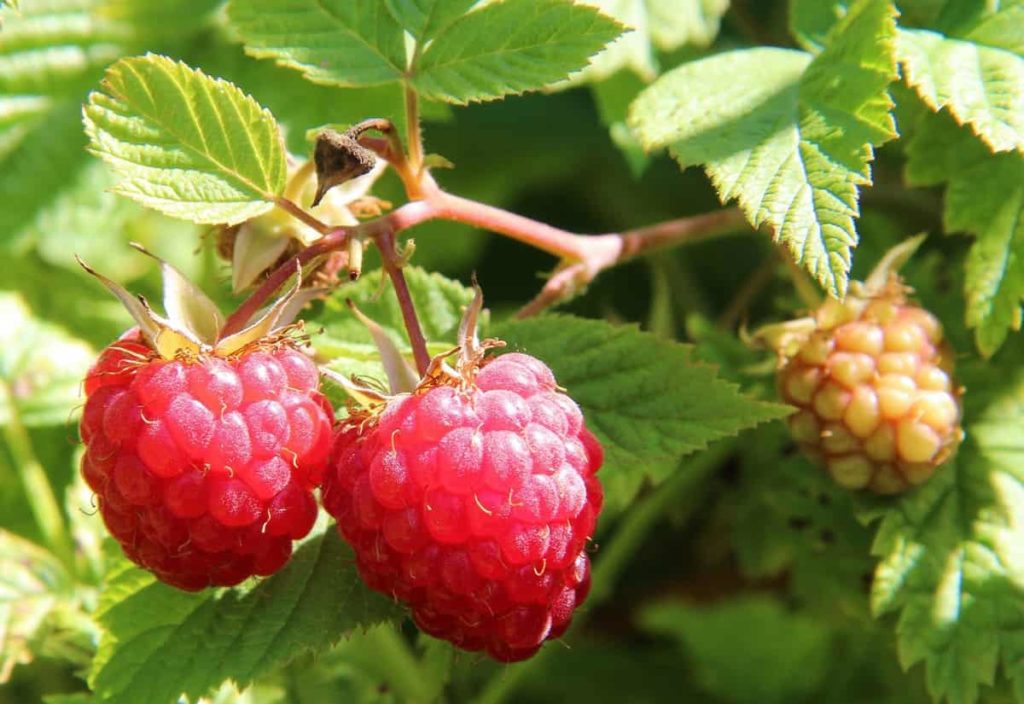
Best Fertilizer for Raspberry Plants
Homemade and liquid fertilizers for Raspberry
- Take four parts canola seed meal, 0.5 parts bone meal, 1-part dolomitic lime, and 1-part kelp meal mix together. Apply this fertilizer in spring, especially after pruning, before new growth. Spread the fertilizer evenly on the dripline circle. This special homemade fertilizer adds nitrogen, phosphorus, potassium, calcium, magnesium, sulfur, copper, manganese, sodium, iron, and zinc to the soil and effectively feeds your Raspberry.
- Wood ash – Ash can be diluted with water and put under Raspberry bushes. Its beneficial properties positively affect the Raspberry, which significantly increases productivity.
- Epsom Salt – 2 teaspoons of Epsom salt per gallon of water is highly effective during the blooming phase of the Raspberry. Epsom salt provides magnesium and sulfur to feed your plants and keeps the soil slightly acidic.
- Coffee grounds – Coffee grounds add nitrogen, phosphorus, potassium, calcium, magnesium, sulfur, copper, iron, and zinc to the soil. Also, it keeps the soil slightly acidic. These nutrients and acidic soil rank on the list of Raspberry requirements.
- Lime – If you have acidic soil, you will need to add some lime as Raspberry prefers a soil pH of about 6.0.
Organic fertilizers for Raspberry
- Blood meal – Nitrogen is high in a blood meal. And it also provides calcium, sodium, magnesium, and other trace minerals. In addition, it is a 100% organic source of nutrients. So, it can be suitable for your Raspberry. Just make sure you don’t go overboard with the request rate.
- Bone meal – Every spring, add bone meal to the border to supply additional nutrients for Raspberry plants.
- If you are looking for organic Raspberry plant fertilizer, you can take cottonseed meal, langbeinite, and rock phosphate (10-3-10 ratio).
- Seaweed – If Raspberry Plants growth is slow as summer, add the seaweed and chicken manure pellets at 100 grams per square meter.
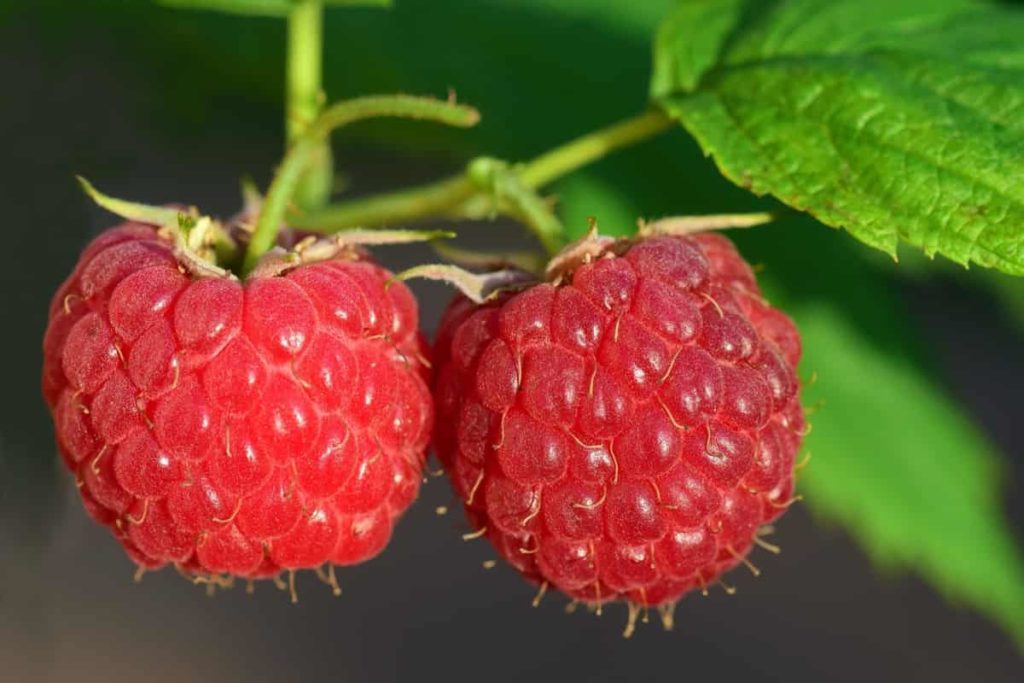
Compost manure for Raspberry
- The Raspberry plants grow best in well-drained, fertile soil. Improve drainage and soil fertility by adding organic matter like compost or manure to your soil in the year before planting. Spread organic matter evenly to the area where you plan to grow your Raspberry, and then repeat this a few times during the growing season.
- Chicken Manure – Prepare the soil in your garden with organic fertilizers before planting the Raspberry. You can prepare the soil with aged cow manure and a handful of chicken manure a few weeks before planting your Raspberry for better results.
Natural fertilizers for Raspberry
Raspberry loves moist soil, so adding mulch after planting is essential to keep moisture in the soil. Use a light mulch like sugarcane or straw mulch that will break down and add extra nutrients to the soil while keeping the weeds away. Raspberry enjoys a 2 to 3-inch layer of mulch. Good mulch for use in the garden includes leaves, lawn clippings, and wood chips or shavings, as they are usually free of weed seeds.
Commercial fertilizers for Raspberry
You have several choices when it comes to feeding the Raspberry bushes. Commercial fertilizers, organic plant foods, or compost. If you’re not concerned about organics, you can provide the Raspberry plants with a balanced commercial fertilizer of 10-10-10 per 100 feet row. Broadcast the fertilizer evenly in a 2-foot band. If you have only a few plants, apply about 56 grams of 10-10-10 spread around the plant.
If you don’t want to use 10-10-10, you can feed the Raspberry plants to water-soluble liquid fertilizers such as 20-20-20. Follow the instructions for the application rate. Always fertilize your juicy plants in spring. Fertilizer, especially when heavy in nitrogen, encourages new growth. It’s good in spring but can be dangerous in summer and fall. Any new growth that appears too late in the season will have time to mature before winter chills and will likely be damaged by frost, which causes unnecessary damage to the plant.
Do not be tempted to fertilize at the end of the season, even if the plants look weak. Fall Bearing Raspberry is a particular case. They will need to give an additional boost to fertilizer in the fall. It is in addition to the regular fertilization schedule. Wait until you see the new blooms and apply 450 to 900 grams of ammonium nitrate for every 100-foot row of Raspberry you are growing. You can also use ammonium sulfate at 680 grams to 1.3 kg per 100 feet.
The lack of boron in Raspberry can produce less production and small fruits. If tests determine that your plants suffer from boron deficiency, boron additives are available as a foliar spray in nurseries. The application of boron is harmful to crop production when no one is required. You should not include this nutrient in your plant unless you have done a test before.
Top 10 Fruits To Grow In Hydroponics
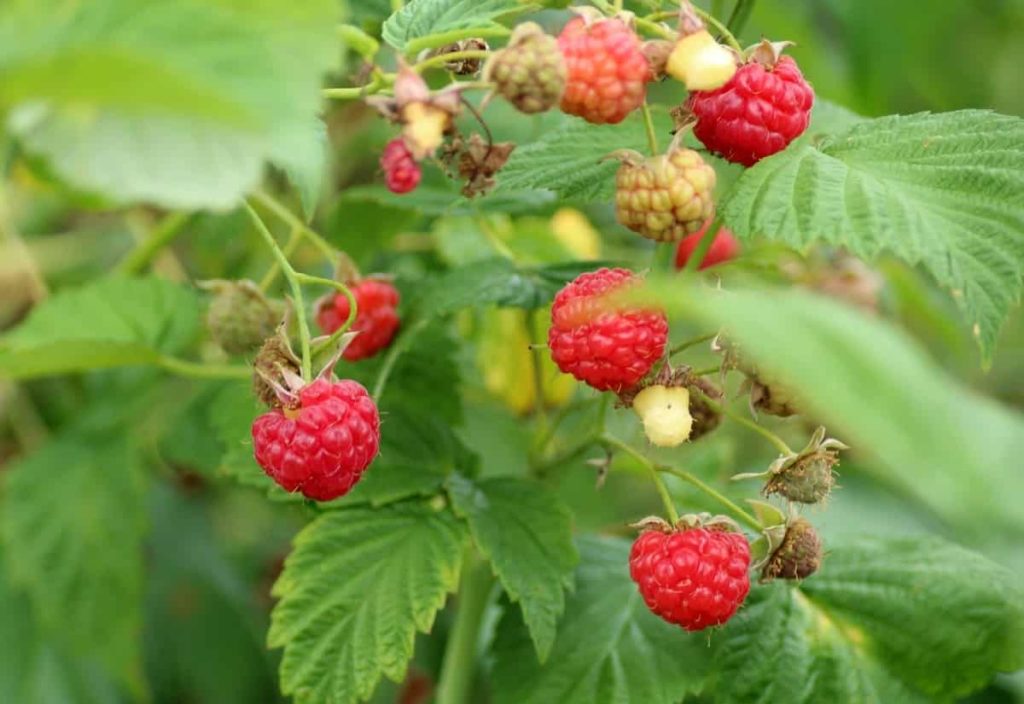
The juicy plants grown in heavy or alkaline soil may be deficient in iron, which looks like yellow or white leaves with green veins. Correct iron deficiency in Raspberry plants uses a product that is 5.4% chelated iron and 12.8% manganese is sprayed at a low rate of 56 to 113 grams per 25 feet in early spring, or apply the product according to its manufacturer’s instructions.
Raspberry fertilizer schedule
The best time to fertilize the Raspberry will depend on your selected formula and application procedure. Slow-release options are usually applied once or twice per growing season to established shrubs and new plants. Once in the spring, as soon as the plants are alive by winter inactivity, they increase resistance to cold winters when needed in the fall. Maintaining ongoing nutrition may require applying liquid fertilizers every 1 to 2 weeks, depending on the brand. Fertilizer should not continue beyond mid-summer. It will prevent the growth of new leaves and fruits, which may be vulnerable to an early frost.
Before planting – Adding fertilizer to the soil before planting the Raspberry helps break the plant material from the covered crops. Growing a covered crop before planting the Raspberry adds organic matter to the soil and helps provide conditions that need to thrive on the Raspberry plants, but crop plants use plant nutrients as they decay. Spread a ready-made fertilizer, 10-10-10 balanced fertilizer, at a low rate of 226 grams per 25 feet of plant row, and mix it in the soil. You can use either water at the site to dissolve the fertilizer in the soil or wait for the next rain to do the job.
After planting – New Raspberry plants benefit from fertilizer nutrients after planting. If the ground is not fertilized for the Raspberry transplant, sprinkle 10-10-10 fertilizer uniformly around each plant 10 to 14 days after planting. Do not sprinkle more than 3 to 4 inches of fertilizer from the Raspberry trunks. Instead, apply water to bring fertilizer to the ground or leave the site alone if rain is expected within the next week. Since manufacturers’ instructions vary from product to product, follow the advice on your fertilizer label.
Growing Fruits In Shade – A Full Guide
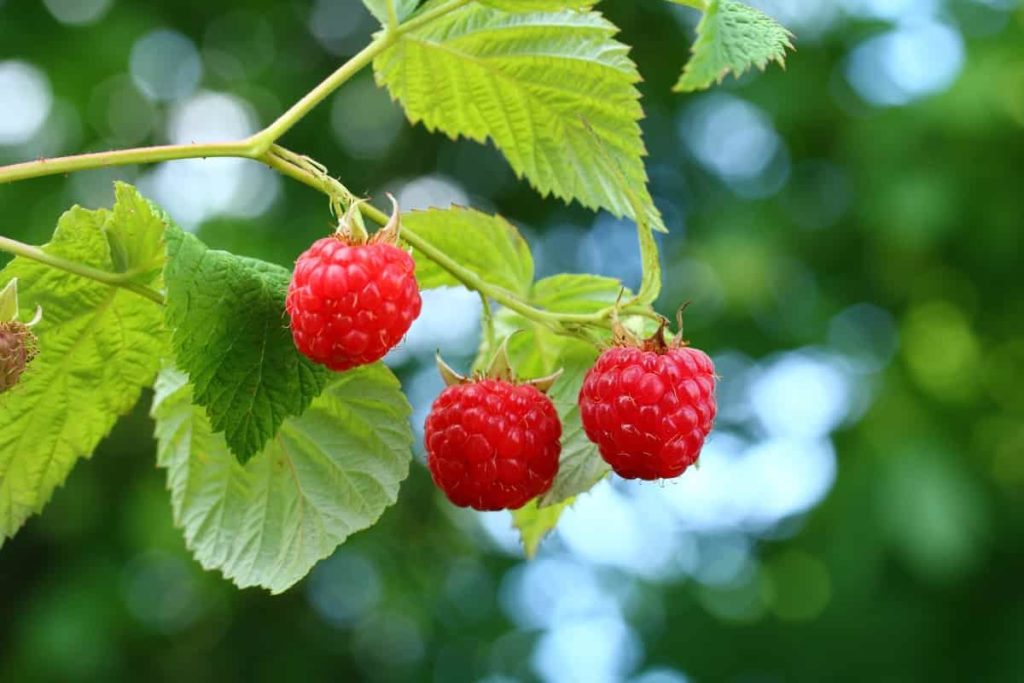
Annual fertilizer application – Chemical and organic fertilizers provide nutrients to established Raspberry plants. When new growth appears on the Raspberry in spring, spread complete 20-20-20 fertilizer 450 to 560 grams per 25 feet of Raspberry plants in a row, avoiding getting fertilizer on plant trunks. You need not water fertilized soil if rain is expected within the next week. When the Raspberry plants start to bloom, spread 113 to 226 grams of ammonium nitrate or 340 to 680 grams of fish meal, blood meal, or feather meal per 25 feet of row.
Re-fertilize the fall fruiting Raspberry when their fruits start to form. Raspberry also benefits from nutrients provided in well-rotted manure or compost. Spread a 3-inch-thick layer of any material around plants in late fall or winter when their leaves fall. Do not allow organic mulch to touch the trunks of the Raspberry.
How to fertilize Raspberry in pots
Raspberry in pots requires a little acidic, nutrient-sustaining, well-draining soil. Any good bagged potting soil work well for these container Raspberries, although it is essential to modify the potting soil with acidic elements like compost, aged manure, or peat moss. Compost and manure also provide crucial nutrition and help in maintaining moisture. Adding balanced fertilizer when preparing your soil for planting will boost nutrients for your plants.
When mixed with fertilizer at planting, a powdered 10-10-10 fertilizer will help maintain your plants for 3 to 4 months. You can also supplement liquid kelp fertilizer with foliar spray once or twice a month for ongoing support when plants are growing. Re-fertilize your container, Raspberry, with 10-10-10 fertilizer in spring, March, and again in May after your first growing season. Add fertilizer to the container throughout the season, and mix the soil surface to control the weeds and moisture.
Frequently asked questions about fertilizers for Raspberry (FAQ)
Why are my Raspberry plants short?
You may find small plants when you give them irregular or inadequate water. Water Raspberry plants one inch every week for good production. Raspberry will not grow up in crowded conditions.
Growing Plants In Paint Buckets For Beginners
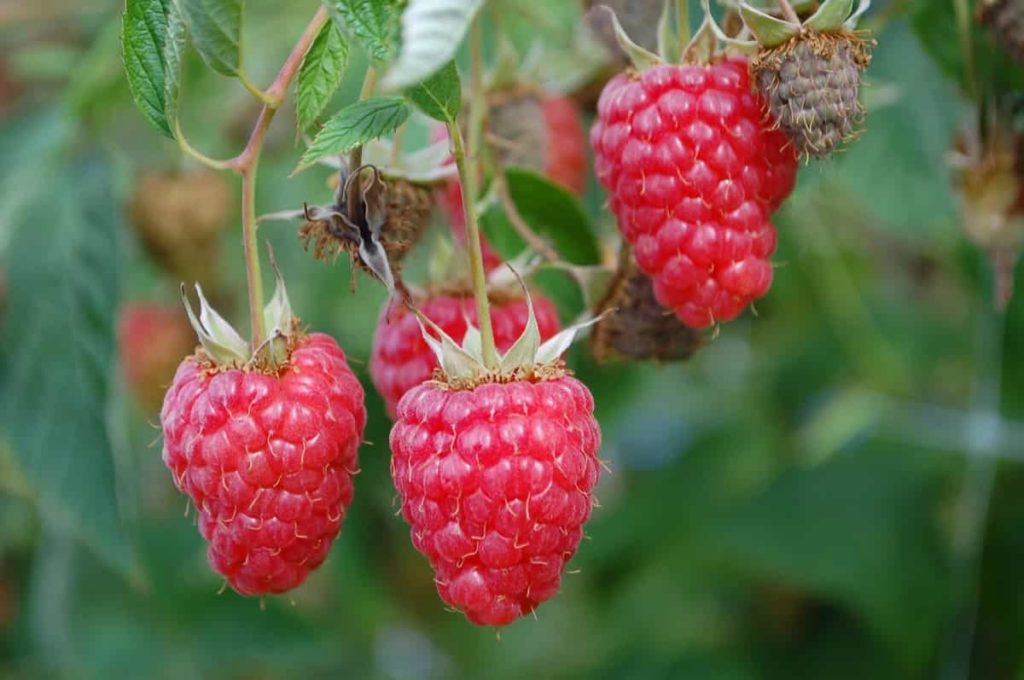
How would you tell if the Raspberries are overwatered?
Slow growth with yellow leaves is also a sign. If your plants have yellow leaves and old leaves and new ones falling at the same high rate, you’re giving more water.
Why is my Raspberry plant not bearing fruit?
Improper pruning is a general reason for no fruit on the Raspberry plants, but other problems can also be a problem. Plants that fail to reach full size or produce fruit can be caused by improper growing conditions, pests, or disease. Raspberry grows best in rich, fertile soil.
How do you fix the yellow leaves on the Raspberry?
If your Raspberry is developing yellow leaves in the middle of summer, it’s likely to cut nutrients, so it would be a great idea to dress them up with chicken manure, which is high in nitrogen, as soon as possible.
Does Raspberry need magnesium?
If your soil is alkaline, it is more likely to happen as Raspberry prefers 6.0 to 6.5 pH. Spray with a foliar feed containing chelated iron. If the symptoms are worse in old leaves, you should suspect a lack of magnesium on the Raspberry, which is more likely to be on light, acid, sandy soil.
- Flower Garden Designs and Layouts for Beginners
- Planting and Spacing Techniques in Papaya: A Beginner’s Guide
- Growing Gold: Essential Techniques for Planting Pineapples
- How to Make Kalanchoe Plant Bushy: Home Remedies and Solutions
- 11 Reasons Why Your Gardenia is Not Blooming: Home Remedies and Solutions
- Eco Elegance: The Guide to Designing a Drought-Tolerant Landscape
- Gardening on a Slope: Strategies for Hillside Landscaping
- Nourish and Flourish: Top Organic Mulches for Thriving House Plants
- Everything You Want to Know about Indian Mogra Flower: Discover Uses and Growing
- Green Thumb Success: Expert Tips for Cultivating Greenhouse Pumpkins All Year Round
- Maximize Growth & Flavor: The Ultimate Guide to Companion Planting in Herb Gardens
- How to Control Rhododendron Problems Naturally: Home Remedies and Organic Ways to Fix Them
- Natural Magic: The Remarkable Benefits of Cinnamon for Plants
- Best Steps to Revive Dying Tulip with Natural and Organic Treatment
- 10 Reasons Why Your Angel Trumpet is Not Blooming: Remedies and Treatment
- How to Fix Periwinkle Leaf and Flower-Related Problems: Natural Remedies and Solutions
- How to Fix Zinnias Leaf and Flower Problems: Discover Natural and Home Remedies
- Organic Steps to Induce Lemon Tree Flowers: A Comprehensive Guide
- Bloom Booster: Crafting the Perfect Homemade Bougainvillea Fertilizer
- Optimizing Growth: A Guide to Applying NPK Fertilizer for Potted Plants
- 10 Best Homemade Fertilizers for Rubber Plant: DIY Recipes and Application Method
- How to Boost Female Pumpkin Flowers: Effective Steps for More Flowers and High Yields
- Transform Your Indoor Garden: Top Benefits of Pink Salt for Houseplants
- 10 Best Homemade Fertilizers for Peacock Plants (Calathea): Easy DIY Guide
- Unlock Blooms: 9 Reasons Why Your Potted Chrysanthemum is Not Blooming
- 8 Reasons Why Your Potted Hibiscus is Not Blooming: Fix it with Simple Solutions
- Unlock Blooms: 9 Key Reasons Your Potted Frangipani Won’t Flower
- 10 Reasons Why Is My Ice Plant Not Blooming: Remedies and Treatment
- 10 Reasons Why My Potted Hydrangea Not Blooming: Treatment and Remedies
- 10 Reasons Why is My Wisteria Not Blooming: Remedies and Treatment
- 10 Reasons Why is My Goldfish Plant Not Blooming: Remedies and Treatment
- Maximize Your Space: Ultimate Guide to Balcony Gardening with Grow Bags
- 10 Reasons Why Your Iris is Not Blooming: Remedies and Treatment
- 10 Reasons Why Your Anthurium Plant is Not Blooming: Treatment and Remedies
- 10 Reasons Why Your Aquaponic Plants Are Not Flowering: Remedies and Treatment
- 10 Reasons Why Your Agapanthus is Not Flowering: Remedies and Treatment
which commercial all in one fertilisers are available for raspberries please